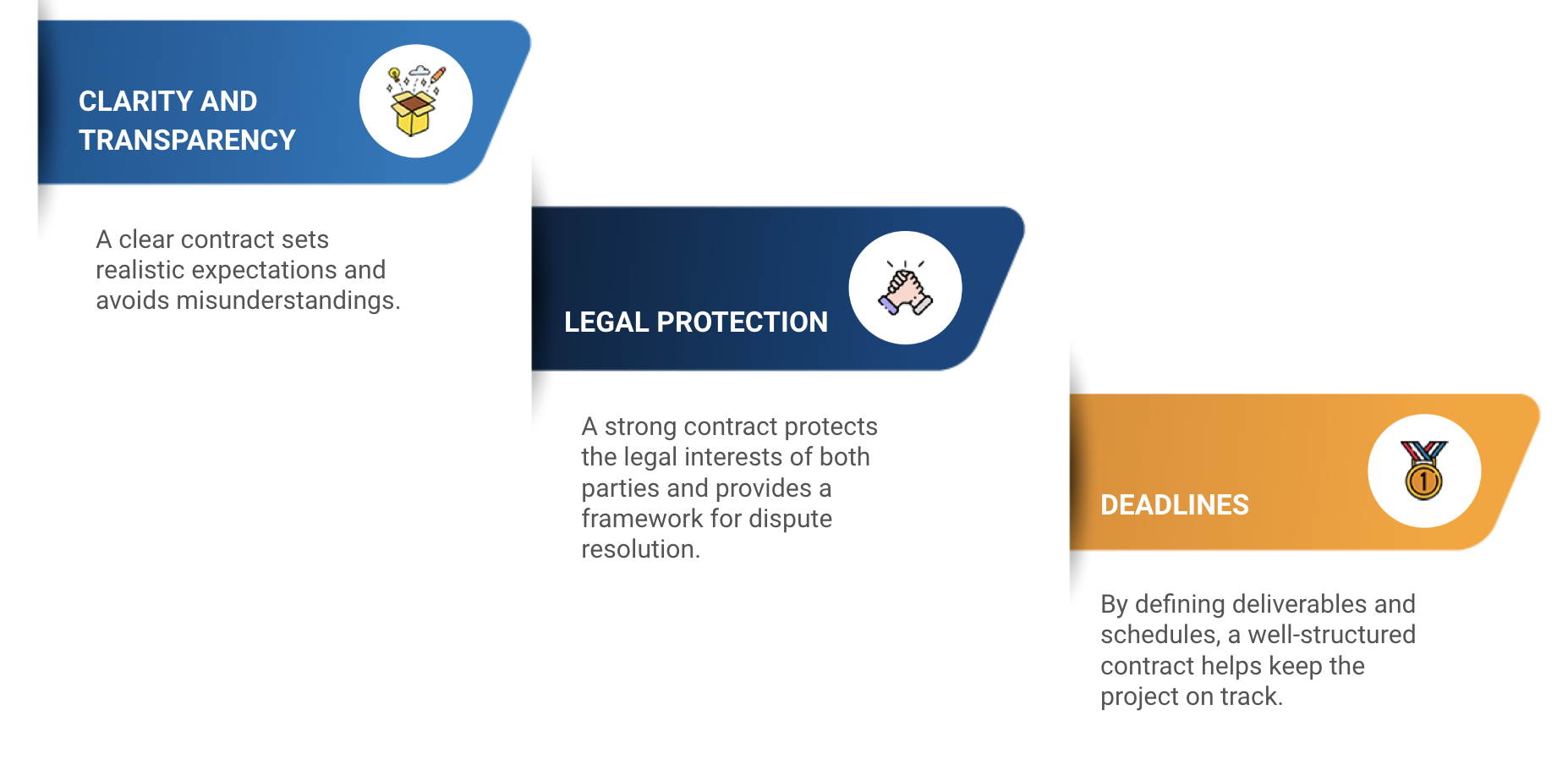
Imagine that your company has decided to expand its software development team to accelerate a critical project. You have chosen to collaborate with an IT staff augmentation agency to provide the necessary technical resources.
Before proceeding, however, you face the crucial task of drafting a solid contract that protects your company's interests and ensures a successful collaboration. This scenario highlights the importance of understanding what essential aspects must be present in an IT staff augmentation contract to ensure an effective and hassle-free relationship.

What is IT Staff Augmentation?
IT staff augmentation is a personnel outsourcing model that allows companies to temporarily expand their work team with professionals specialized in information technologies. This approach is especially useful when companies need to address specific projects without incurring the costs and responsibilities associated with hiring permanent employees.
IT staff augmentation agencies provide highly trained talent to fill skills gaps and meet tight deadlines. However, to maximize the benefits of this model, it is crucial to have a well-defined contract that establishes the expectations, responsibilities and conditions of the collaboration.
Importance of a solid IT staff augmentation contract
An IT staff augmentation contract not only defines the terms and conditions of the collaboration, but also protects the interests of both parties involved. A solid contract helps avoid misunderstandings, establishes clear criteria for project success, and provides a framework for dispute resolution.
Below are five essential aspects that must be present in an IT staff augmentation contract:
1. Project scope and deliverables
- Clear definition of the project
The contract should begin with a detailed description of the project and its objectives. This includes an overview of the project, the purpose of the collaboration, and the specific goals to be achieved. A clear project definition ensures that both parties are aligned from the beginning and have a shared understanding of what is expected to be achieved.
- Deliverables and schedule
The contract should specify the expected deliverables and the associated schedule. This includes key milestones, delivery dates, and acceptance criteria for each phase of the project. Clarity on deliverables and schedule helps maintain focus and ensures the project moves forward as planned.

2. Roles and responsibilities
- Role assignment
The contract should clearly outline the roles and responsibilities of each party involved in the project. This includes the responsibilities of the client and the IT staff augmentation agency. For example, the client may be responsible for providing necessary access to systems, while the agency is responsible for delivering the work according to agreed standards.
- Project and communication leaders
It is important to identify project leaders from both parties and establish a clear communication protocol. This ensures there is an effective communication channel to resolve questions, address issues, and coordinate activities.
3. Intellectual property and confidentiality
- Intellectual Property Rights
The contract should address ownership of intellectual property created during the project. It is essential to define who will own the copyrights, patents or other forms of intellectual property resulting from the work performed. Generally, the client retains ownership of the intellectual property, but it is important to state this clearly in the contract.
- Confidentiality agreement
Confidentiality is essential in IT staff augmentation collaborations. The contract should include a confidentiality agreement that protects sensitive information and prohibits its disclosure to unauthorized third parties. This helps safeguard client data and trade secrets.
4. Payment terms and rates
- Fee structure
The contract should detail the fee structure agreed upon between the parties. This includes the hourly rate or the total cost of the project, as well as any additional expenses that may arise during the collaboration. Transparency in the fee structure helps avoid financial surprises and ensures that both parties have clear expectations.
- Payment conditions
It is important to specify payment terms in the contract, including payment terms, accepted payment methods, and penalties for late payments. Establishing clear payment terms ensures that both parties are aligned on financial expectations.

5. Dispute resolution and termination of contract
- Dispute resolution mechanism
The contract should include a dispute resolution mechanism that describes how any disagreements or conflicts that may arise during the project will be handled. This may include mediation, arbitration or litigation, and it is important that both parties agree to the process.
- Termination conditions
The contract must establish the conditions under which either party can terminate the collaboration. This includes valid reasons for termination, required notice, and any financial liability in the event of early termination.
Benefits of a well-defined contract with an IT staff augmentation agency
Having a well-defined contract for your IT staff augmentation agency offers a number of key benefits:
Clarity and Transparency
A clear contract sets realistic expectations and avoids misunderstandings, which improves collaboration and trust between parties.
Legal Protection
A strong contract protects the legal interests of both parties and provides a framework for resolving disputes fairly.

Deadlines
By defining deliverables and schedules, a well-structured contract helps keep the project on track and within established deadlines.
Resource Optimization
By outlining roles and responsibilities, the contract ensures efficient resource allocation and effective collaboration between teams.
A well-written IT staff augmentation contract is essential to ensure a successful collaboration between a company and an IT staff augmentation agency. By including essential aspects such as project scope, roles and responsibilities, intellectual property, payment terms and dispute resolution mechanisms, companies can maximize the benefits of this outsourcing model and protect their business interests.
Before signing an IT staff augmentation contract, it is recommended that business leaders and managers carefully review every aspect of the contract and, if necessary, consult with legal counsel to ensure that all parties are aligned and agree to the terms. .
This not only strengthens the relationship with the IT staff augmentation agency, but also lays the foundation for a successful and mutually beneficial collaboration.


